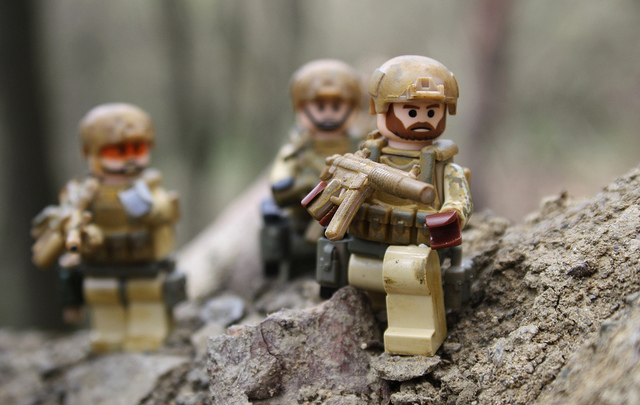 We’re kicking off today in the Asia Pacific region with this East Asia Forum post by TJ Pempel on why Japan’s collective self-defence is so politicised. The piece explains Japan’s recent developments as more than a mere ‘shift to the right’ and looks at the implications of collective self-defence for grand security strategy.
We’re kicking off today in the Asia Pacific region with this East Asia Forum post by TJ Pempel on why Japan’s collective self-defence is so politicised. The piece explains Japan’s recent developments as more than a mere ‘shift to the right’ and looks at the implications of collective self-defence for grand security strategy.
What should the US do about the challenges posed by China in South China Sea? In a new Brookings Foreign Policy Brief, Jeffrey Bader, Kenneth Lieberthal and Michael McDevitt argue that the US must clearly define its interests in the area and pursue actions such as ‘lowering the volume of US government rhetoric over unilateral actions in the South China Sea that produce minor alterations in the status quo’. Read the full report here (10 pages).
Also on China and the South China Sea, Lim Kheng Swe at RSIS looks at whether maritime disputes can be isolated from other elements of China–ASEAN relations like trade and investment.
Meanwhile, over at CIMSEC Armando J. Heredia looks at what the attempted capture of Filipino peacekeepers by the al Nusra Front near the Israeli–Syrian border last week tells us about the Syrian government. According to Heredia: ‘What was notable is that the Al-Assad Syrian Army fired artillery rounds during the Outpost 68 firefight to help suppress the rebel assault… Additionally, this is a strong indicator that the Assad regime is not as unstable as the popular media narrative would indicate. The ability to quickly and effectively deliver indirect fire into the Area of Separation speaks to the existence of intact and professional Syrian Army elements despite the widespread Civil War.’ Keep reading here.
Unlike their Filipino colleagues who escaped, Fijian peacekeepers were captured by the militants, and ASPI’s Lisa Sharland talks with Radio Australia about the challenges facing UN peacekeeping operations in light of these developments.
Despite ISIS dominating international security news, al Qaeda hasn’t faded into the background: the group has apparently established a new branch on the Indian subcontinent. Current leader Ayman al-Zawahiri announced the news in a 55-minute video which was viewed by some analysts as an effort to rival ISIS’ recruitment. Over at DefenseOne, Bobby Ghosh says the announcement ‘emits a strong odor of desperation’ and questions the success of Zawahiri securing men and money from local militant groups looking for the same. Daveed Gartenstein Ross has expressed a different view:
The fact that the expert community finds IS more compelling than AQ doesn't actually render AQ irrelevant or its expansion a mere stunt.
— Daveed Gartenstein-Ross (@DaveedGR) September 4, 2014
His subsequent tweet references his earlier work, which explores how al Qaeda’s absence from the Arab Spring was misread as its demise, and its relevance to ‘expert discussion’ on aQ today.
Representatives from all 28 NATO member states have met in Wales this week for what’s being described as the ‘largest gathering ever of international leaders in the UK’. Here are some resources to help you get up to speed on the summit and its main outcomes:
- the Joint Statement of the NATO–Ukraine Commission condemning Russia’s ‘continued and deliberate destabilization of eastern Ukraine’,
- the Wales Summit Declaration on Afghanistan which sets out future actions and support in Afghanistan,
- the BBC’s live blog for all of Day 1’s events, and
- a live video feed which includes a countdown to the next event.
NATO has reinvented itself in less than six months, moving from crisis management to a fundamentally new defence posture, writes Carnegie Europe’s director Jan Techau. Techau explains Russia’s actions in Ukraine have spurred the development of a Readiness Action Plan that allows NATO troops to rotate in and out of the eastern flank. Rather than focusing on expeditionary tasks, the original core business of the group—territorial defence—is ‘back at the heart of the alliance’. For more on why that matters, keep reading here.
How do humans respond to robots? Heather Knight explores this question in the second Brookings pick for this week. In her words, her report describes a series of important choices humans face in designing robots. With the increased use of unmanned platforms in defence forces worldwide, her work explores important questions surrounding human–robot relations in both military and civilian contexts and across different cultures.
Podcast
What are the drivers behind Japan’s remilitarisation and what are its implications for regional relations and stability? In a new CIMSEC Sea Control podcast, I interview Dr Tomohiko Satako, a fellow at the National Institute for Defense Studies in Tokyo and visiting fellow at ASPI, and ASPI’s Ben Schreer on Japan’s constitutional reinterpretation, its new white paper, and relations with China and Australia (27mins).
Meanwhile, Loopcast’s Chelsea Daymon interviews Dr.Krypt3ia on how jihadis use encryption software and their broader OPSEC methods (57mins). According to Loopcast, his work in this area is available here, here and here.
Events
Land Forces 2014 is a four-day land defence exhibition and forum for Australia, Asia and the Indo-Pacific region, held on 22–25 September at the Brisbane Convention & Exhibition Centre, Brisbane. Full program available here.
Natalie Sambhi is an analyst at ASPI and managing editor of The Strategist. Image courtesy of leg0fenris.

